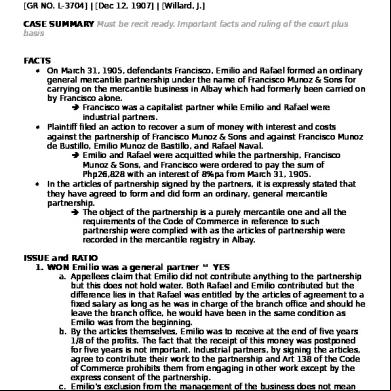Family Values Of The Filipino,japanese,and Chinese 6n164r
This document was ed by and they confirmed that they have the permission to share it. If you are author or own the copyright of this book, please report to us by using this report form. Report 3i3n4
Overview 26281t
& View Family Values Of The Filipino,japanese,and Chinese as PDF for free.
More details 6y5l6z
- Words: 603
- Pages: 22
FAMILY VALUES OF THE FILIPINO, JAPANESE, AND CHINESE
FAMILY VALUES OF THE FILIPINOS
• Filipinos are known for having a strong family ties. A family is a basic unit of society here in the Philippines. • Filipinos treasured their family so much. They keep on helping each other as long as they can. • A Filipino have this thought in mind "family first", that immediate family are willing to sacrifice for the sake of their family just like the parents do.
Family values of the Filipinos • Spirit of kinship and camaraderie – a Filipino community spirit and cooperation wherein a group of individuals extend a helping hand without expecting any remuneration.
• Familism ( Close family relations) – Filipino trait of giving highest importance to family above other thing. – Example: (the short story, “The Mats,” show how important family is to a Filipino)
• Boy & Girl Boy: Do you love me more than your family? Girl: No! Boy: Why? Girl: Okay listen to this... When I started to walk, I fell, you were not there to pick me up. But my mom was. When I went outside, you were not there to hold my finger. But my dad was. When I cried, you didn’t give me your toys to play. But my brother and sister did.
Hospitality - A Filipino trait of being receptive and generous to guests.
FAMILY VALUES OF THE JAPANESE
Family Values of the Japanese • Family is significantly valued in their societal viewpoint. Family are always put before others in society. • The Japanese take care of extended family more often. Harmony - A Japanese trait of maintaining harmony and avoiding conflict in the family. Every family should be humble.
• Achievement A Japanese trait in which family accomplish something in their life to put honor in their family ,and it is believed to be the most important than who you are when you are born.
• Respect to the elders It is a Japanese trait in which they have a great deal of respect for their elders and value them as critical of society.
• Bowing Japanese bow when they meet or part from each other, in order to show gratitude or respect.
FAMILY VALUES OF THE CHINESE
• Filial Piety A central concept in Chinese family values is the idea of "filial piety," or respecting parents and grandparents. Children are traditionally expected to be obedient to their parents.
• Family Interdependence Connected to filial piety is a belief in the interdependence of family . Chinese parents typically raise their children not to be independent, but to be integrated into the family.
Filial Piety
•
Marriage - In China, women are often expected to marry men of higher social status than their own, usually someone either more educated or older. - a son is expected to remain in his parents' family even after marrying, while a daughter is expected to the family of her husband.
• Gender Roles Chinese society and family structures are known for being patriarchal -- that is, based on the power of men over women.
Men -are traditionally considered the heads of their households, and ancestry is traced only along male lines. Son-are expected to their parents for their whole lives.
• Women -women's work was centered on the home. Tasks such as preparing food, cleaning and looking after children were the norm for the majority of women in ancient China.
• Daughters are to be married off to other families
• Chinese parents have traditionally valued boys much more highly than girls.
FAMILY VALUES OF THE FILIPINOS
• Filipinos are known for having a strong family ties. A family is a basic unit of society here in the Philippines. • Filipinos treasured their family so much. They keep on helping each other as long as they can. • A Filipino have this thought in mind "family first", that immediate family are willing to sacrifice for the sake of their family just like the parents do.
Family values of the Filipinos • Spirit of kinship and camaraderie – a Filipino community spirit and cooperation wherein a group of individuals extend a helping hand without expecting any remuneration.
• Familism ( Close family relations) – Filipino trait of giving highest importance to family above other thing. – Example: (the short story, “The Mats,” show how important family is to a Filipino)
• Boy & Girl Boy: Do you love me more than your family? Girl: No! Boy: Why? Girl: Okay listen to this... When I started to walk, I fell, you were not there to pick me up. But my mom was. When I went outside, you were not there to hold my finger. But my dad was. When I cried, you didn’t give me your toys to play. But my brother and sister did.
Hospitality - A Filipino trait of being receptive and generous to guests.
FAMILY VALUES OF THE JAPANESE
Family Values of the Japanese • Family is significantly valued in their societal viewpoint. Family are always put before others in society. • The Japanese take care of extended family more often. Harmony - A Japanese trait of maintaining harmony and avoiding conflict in the family. Every family should be humble.
• Achievement A Japanese trait in which family accomplish something in their life to put honor in their family ,and it is believed to be the most important than who you are when you are born.
• Respect to the elders It is a Japanese trait in which they have a great deal of respect for their elders and value them as critical of society.
• Bowing Japanese bow when they meet or part from each other, in order to show gratitude or respect.
FAMILY VALUES OF THE CHINESE
• Filial Piety A central concept in Chinese family values is the idea of "filial piety," or respecting parents and grandparents. Children are traditionally expected to be obedient to their parents.
• Family Interdependence Connected to filial piety is a belief in the interdependence of family . Chinese parents typically raise their children not to be independent, but to be integrated into the family.
Filial Piety
•
Marriage - In China, women are often expected to marry men of higher social status than their own, usually someone either more educated or older. - a son is expected to remain in his parents' family even after marrying, while a daughter is expected to the family of her husband.
• Gender Roles Chinese society and family structures are known for being patriarchal -- that is, based on the power of men over women.
Men -are traditionally considered the heads of their households, and ancestry is traced only along male lines. Son-are expected to their parents for their whole lives.
• Women -women's work was centered on the home. Tasks such as preparing food, cleaning and looking after children were the norm for the majority of women in ancient China.
• Daughters are to be married off to other families
• Chinese parents have traditionally valued boys much more highly than girls.










